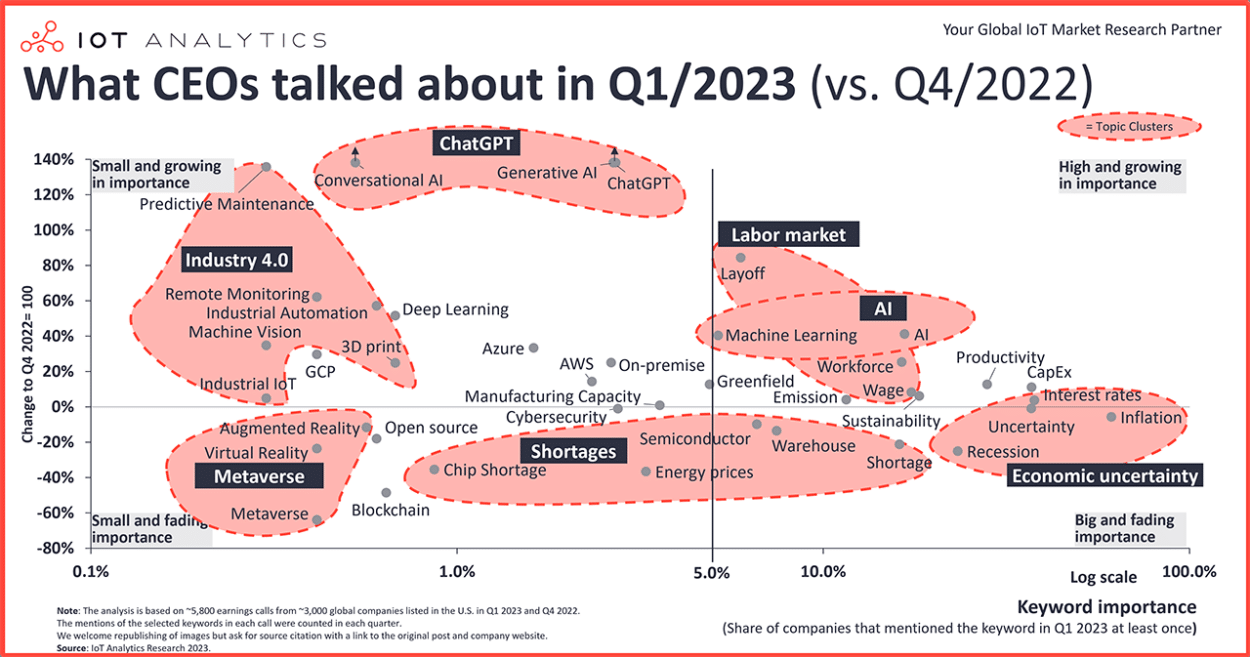According to the “What CEOs Discussed” report published by market research firm IoT Analytics, three prominent themes gained significant attention during Q1/2023 earnings calls. Topping the list is the emergence of AI and ChatGPT, followed by discussions on the labor market and Industry 4.0. Economic uncertainty with concerns related to inflation, recession, and interest rates, is the most crucial topic cluster of interest among CEOs. Sustainability is not mentioned.
This study, which highlights the results of earnings calls of approximately 3,000 companies listed in the United States, is important as CEOs’ prioritization of specific topics is expected to result in increased investment in those areas.
According to the author Philipp Wegner, in the first quarter of 2023, economic uncertainty was a major concern for CEOs across various industries. 61% of all earnings calls discussed inflation, 23% talked about recession, and 38% mentioned interest rates.
The Key Upcoming Themes: AI, Labor Market, and Industry 4.0

Amid the economic uncertainty, CEOs also highlighted several key upcoming themes in their earnings calls. One of the most important was artificial intelligence, which was discussed by 17% of CEOs. The release of OpenAI’s ChatGPT sparked discussions around potential use cases of AI in general.
According to Satya Nadella, CEO, of Microsoft (24 January 2023):
“We’re excited about ChatGPT being built on Azure and having the traction it has. So, we look to both. There is an investment part to it and there is a commercial partnership. But fundamentally, it’s going to be something that’s going to drive, I think, innovation and competitive differentiation in every one of the Microsoft solutions by leading in AI.
For Arvind Krishna, IBM’s CEO, (25 January 2023):
“AI has become a big topic of conversation this year […] If I think about it, over the last decade, I think there were three moments you can talk about, […] One, when IBM won Jeopardy with Watson, […] Second, when deep mind from Google or Alphabet started winning competitions around, for example, GO […] and now with OpenAI and ChatGPT.”
The labor market also continued to rise in importance on CEOs’ list of topics. Layoffs were discussed in 6% of all earnings calls. Additionally, 18% of earnings calls discussed wages. CEOs are closely monitoring the labor market, as workforce dynamics and compensation policies have a significant impact on their businesses.
Another key upcoming theme in Q1/2023 was Industry 4.0 and related topics. CEOs are exploring ways to leverage Industry 4.0 technologies to optimize their operations, improve efficiency, and gain a competitive edge. Industrial automation was discussed in 0.6% of all earnings calls. Predictive maintenance is also seeing increased interest from CEOs.
Declining Themes: Supply Shortages and the Metaverse
While certain themes gained prominence, some topics declined in importance in Q1/2023. Supply shortages, which were a significant concern for CEOs in the previous quarter, decreased by 21% in general and 35% specifically for chip shortages. With supply chains slowly improving and shortages easing, CEOs’ discussions around supply shortages decreased.
Another theme that reduced in importance in Q1/2023 is the metaverse. The keyword “metaverse” declined by 64% in earnings calls, indicating a decrease in interest in this topic. Related technologies, such as virtual reality (-24%) and augmented reality (-12%), also declined. This could be attributed to the fact that the metaverse is still in its early stages of development, and CEOs may be taking a more cautious approach in evaluating its potential impact on their businesses.
According to Jordan Wu, CEO of Himax Technologies (9 February 2023)
“Metaverse-related developments are early in the lifecycle but overall remain an attractive opportunity for us potentially.”
Unmentioned Topic: Sustainability
We noticed the notable absence of sustainability as a relevant topic for CEOs in this report. Despite the increasing importance of environmental issues in the current context, and as many global companies have set the target to be climate-neutral by 2050, the report’s results do not highlight the implications of sustainability on the business strategies of the studied companies.










